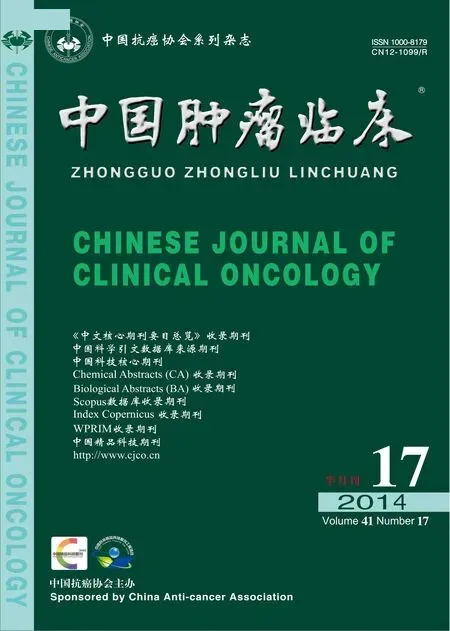晚期非小细胞肺癌T790M突变的检测方法及临床意义*
张秋怡 吴一龙 周 清
·国家基金研究进展综述·
晚期非小细胞肺癌T790M突变的检测方法及临床意义*
张秋怡①②吴一龙②周 清②
表皮生长因子受体酪氨酸激酶抑制剂(epidermal growth factor receptor-tyrosine kinase inhibitors,EGFR-TKIs)是EGFR活化突变阳性晚期非小细胞肺癌(non-small cell lung cancer,NSCLC)患者的有效治疗药物,然而,几乎所有服药患者最终将出现耐药,第20号外显子的T790M点突变可能是导致耐药的机制之一,如何敏感、准确地检测T790M基因突变是技术关键,外周血检测因创伤小、操作简便而成为近几年研究热点,实时定量检测血浆T790M突变有望成为监测EGFR-TKI疗效的有效途径。目前,T790M突变的临床意义尚存争议,近年来出现的第三代EGFR-TKI对T790M突变阳性患者的有效率较高,使得克服T790M突变导致的耐药成为可能。本文就T790M检测方法及其临床意义进行综述。
非小细胞肺癌 表皮生长因子受体 T790M突变 定量检测
随着转化医学的飞速发展,晚期非小细胞肺癌(NSCLC)患者的治疗已从化疗时代转向分子靶向治疗时代,其中表皮生长因子受体(epidermal growth factor receptor,EGFR)是最重要的肺癌驱动基因,EGFR-TKIs是针对此靶点的小分子抑制剂,多项临床试验已证实,EGFR基因活化突变的晚期NSCLC患者能从EGFR-TKI显著获益[1-2]。然而,几乎所有服用EGFR-TKI的患者最终将出现耐药[3],早期研究发现,约50%耐药的患者具有EGFR20号外显子第790位密码子错义突变(即T790M突变)[4],并且与EGFR-TKI疗效密切相关[5-6],如何敏感、准确地检测T790M基因突变成为关注热点及技术关键。此外,关于T790M突变的临床意义尚存争议,本文就其突变检测方法及其临床意义进行综述。
1 T790M基因突变的定性检测
T790M突变的检测方法推陈出新,主要检测技术包括直接测序法、扩增阻滞突变系统法(amplified refractory mutation system,ARMS)、蝎形探针扩增阻滞突变系统法(scorpions-ARMS)、突变富集PCR法、克隆杂交法、核酸肽锁核酸PCR法、变性高效液相色谱法、质谱分析法、基质辅助激光解析电离飞行时间质谱法(matrix-assisted laser desorption/ionization time of flight mass spectrometry,MALDI-TOF MS)及二代测序法(next-generation sequencing,NGS)等,其中MALDI-TOF MS、克隆杂交法及NGS除能对T790M突变定性检测外,还能对其进行定量检测。
一直以来,直接测序法是EGFR突变的标准检测方法[1,7],也有学者用于血液检测,但其过程繁琐、耗时长,且敏感性很低[8-9]。ARMS法灵敏度可达0.1%~1%[10-11],SARMS法是将ARMS法与Scorpion实时PCR相结合的一种新技术,其经全基因组扩增后能提高T790M突变阳性检出率[12]。Arcila等[13]学者用核酸肽锁核酸PCR法检测EGFR-TKI耐药肺癌患者的T790M突变,检出率高达68%,用MALDI-TOF MS检测T790M突变的阳性率为25%~32%,其中Su等[6,14]的结果经过二代测序验证;Fujita等[15]用CH方法检测pre-TKI活化突变患者的T790M阳性率达79%。提示SARMS法敏感度和特异性较高,且已有商品试剂盒,操作方便、重复性好,适合应用于临床。NGS是近年发展起来的高通量深度测序技术群,可一次性对几百万条至十亿条DNA分子进行并行测序,但其对稀有突变及结构变异不敏感,且价格昂贵,不适于广泛应用。
2 T790M基因突变的定量检测
Zhou等[16]率先提出EGFR-TKI疗效不仅与EGFR突变状态有关,而且与突变丰度有关。目前,定量检测T790M突变技术有限,文献报道主要有数字PCR法(digital PCR,dPCR)、实时荧光定量PCR法(real time quantitative PCR,qPCR)和NGS法。
Nakamura等[17]采用突变偏差PCR联合猝灭探针法[mutation-biased PCR quenching probe(MBP-QP)method,MBP-QP]方法实现了血浆T790M的动态定量检测。Taniguchi等[18]用BEAMing(beads,emulsion,amplification,magnetics)技术定量检测44例患者血浆的EGFR耐药突变,检出率为43.5%,敏感性可达0.01%[18]。BEAMing是由Diehl等[19-20]提出的一种基于磁珠和微乳液的固相数字PCR技术,其敏感性仅受限于PCR过程中引入的突变(此种情况在PCR中较常见),故其敏感性比其他方法高。Oxnard等[21]用微滴式数字PCR(droplet digital PCR,ddPCR)检测NSCLC患者血浆T790M突变,敏感度为0.5%~0.05%,特异性达100%,可在影像学进展前16周检测出血浆T790M突变,并且与19号外显子缺失突变量呈平行的变化关系。
qPCR在常规PCR基础上增加荧光染料和探针而实现相对定量,根据Ct值及标准曲线计算出初始DNA模版相对量,受扩增效率影响。而dPCR是一种核酸分子绝对定量技术,其不依赖于Ct值及标准曲线、不受扩增效率影响,扩增结束后通过直接计数或者泊松分布公式计算每个反应单元格的平均浓度(含量),能将误差控制在5%以内,dPCR更精确[22]、更易检测稀有基因突变以及不易被抑制[23-24],对于检测存在大量背景野生型的罕见突变具有重大意义,但其设备昂贵,对操作人员要求高,难以在临床推广。
3 T790M检测的临床意义
目在EGFR-TKI治疗前、疾病进展后以及治疗过程中检测T790M突变各有临床意义。治疗前对患者肿瘤组织进行T790M检测可能预测EGFR-TKI的疗效。Su等[6]研究发现,治疗前同时发生EGFR L858R突变或19外显子缺失及T790M突变患者的无进展生存劣于仅发生L858R突变或19号外显子缺失患者,但优于不存在上述突变患者,故该研究认为原发T790M突变是EGFR-TKI疗效的不良预测因子[6],此结果与Rosell等[25]研究一致。相比定性检测,定量检测T790M突变能更精确指导临床,Lee等[14]研究发现,在服用EGFR-TKI前伴T790M突变患者中,高丰度组比低丰度组有着更短的无进展生存期及总生存期,提示治疗前T790M的突变丰度与EGFR-TKI疗效及预后相关。
疾病进展后检测T790M突变有助于了解EGFR-TKI的耐药机制,为制订克服耐药策略提供依据。目前针对T790M靶点的第三代EGFR-TKI,如AZD9291[26]、CO-1686[27]、HM61713等药物快速涌现,疾病进展后T790M突变状态与生存的关系正在探索中,Oxnard等[28]的研究显示,T790M突变阳性患者的进展后生存期显著长于无T790M突变患者。因此,治疗后T790M突变尽管是EGFR-TKI的耐药原因,但也可能是进展后生存的良好预后因子。
在EGFR-TKI治疗期间连续动态检测血浆T790M突变状态,可以为预测疗效、监测耐药提供更多信息。Oxnard等[28]报道了在EGFR敏感突变患者中血浆连续检测T790M突变与影像学肿瘤变化的关系,发现血浆T790M在影像学疾病进展的16周前已经出现,提示在EGFR-TKI治疗过程中动态监测T790M基因状态有可能预测耐药,不仅可以指导晚期NSCLC患者的治疗,而且有助于探究T790M突变诱导的耐药机制及其异质性[21]。
4 结语
T790M突变是EGFR-TKI耐药的研究热点,其耐药机制、异质性及临床意义仍需进一步探讨,未来使用更敏感、准确、简便的方法检测T790M突变,如用敏感特异的方法实时定量检测血浆T790M突变,可能监测EGFR-TKI疗效及进一步揭示T790M突变在耐药中的作用,随着第三代EGFR-TKI药物的研究进展,克服T790M导致的耐药成为可能。
1 Han JY,Park K,Kim SW,et al.First-SIGNAL:first-line single-agent iressa versus gemcitabine and cisplatin trial in never-smokers with adenocarcinoma of the lung[J].J Clin Oncol,2012, 30(10):1122-1128.
2 Zhou C,Wu YL,Chen G,et al.Erlotinib versus chemotherapy as first-line treatment for patients with advanced EGFR mutation-positive non-small-cell lung cancer (OPTIMAL, CTONG-0802):a multicentre,open-label,randomised,phase 3 study [J].Lancet Oncol,2011,12(8):735-742.
3 Pao W,Miller VA,Politi KA,et al.Acquired resistance of lung adenocarcinomas to gefitinib or erlotinib is associated with a second mutation in the EGFR kinase domain[J].PLoS Med,2005,2(3):e73.
4 Sequist LV,Waltman BA,Dias-Santagata D,et al.Genotypic and histological evolution of lung cancers acquiring resistance to EGFR inhibitors[J].Sci Transl Med,2011,3(75):26-75.
5 Maheswaran S,Sequist LV,Nagrath S,et al.Detection of mutations in EGFR in circulating lung-cancer cells[J].N Engl J Med, 2008,359(4):366-377.
6 Su KY,Chen HY,Li KC,et al.Pretreatment epidermal growth factor receptor(EGFR)T790M mutation predicts shorter EGFR tyrosine kinase inhibitor response duration in patients with non-small-cell lung cancer[J].J Clin Oncol,2012,30(4):433-440.
7 Paez JG,Janne PA,Lee JC,et al.EGFR mutations in lung cancer:correlation with clinical response to gefitinib therapy[J].Science,2004, 304(5676):1497-1500.
8 Kimura H,Suminoe M,Kasahara K,et al.Evaluation of epidermal growth factor receptor mutation status in serum DNA as a predictor of response to gefitinib(IRESSA)[J].Br J Cancer,2007,97(6):778-784.
9 Bell DW,Haber DA.A blood-based test for epidermal growth factor receptor mutations in lung cancer[J].Clin Cancer Res,2006,12 (13):3875-3877.
10 Ellison G,Donald E,Mcwalter G,et al.A comparison of ARMS and DNA sequencing for mutation analysis in clinical biopsy samples[J].J Exp Clin Cancer Res,2010,29:132.
11 Kimura H,Fujiwara Y,Sone T,et al.High sensitivity detection of epidermal growth factor receptor mutations in the pleural effusion of non-small cell lung cancer patients[J].Cancer Sci,2006,97(7):642-648.
12 Kuang Y,Rogers A,Yeap BY,et al.Noninvasive detection of EGFR T790M in gefitinib or erlotinib resistant non-small cell lung cancer[J].Clin Cancer Res,2009,15(8):2630-2636.
13 Arcila ME,Oxnard GR,Nafa K,et al.Rebiopsy of lung cancer patients with acquired resistance to EGFR inhibitors and enhanced detection of the T790M mutation using a locked nucleic acid-based assay[J].Clin Cancer Res,2011,17(5):1169-1180.
14 Lee Y,Lee GK,Lee YS,et al.Clinical outcome according to the level of preexisting epidermal growth factor receptor T790M mutation in patients with lung cancer harboring sensitive epidermal growth factor receptor mutations[J].Cancer,2014,120(14):2090-2098.
15 Fujita Y,Suda K,Kimura H,et al.Highly sensitive detection of EGFR T790M mutation using colony hybridization predicts favorable prognosis of patients with lung cancer harboring activating EGFR mutation[J].J Thorac Oncol,2012,7(11):1640-1644.
16 Zhou Q,Zhang XC,Chen ZH,et al.Relative abundance of EGFR mutations predicts benefit from gefitinib treatment for advanced non-small-cell lung cancer[J].J Clin Oncol,2011,29(24):3316-3321.
17 Nakamura T,Sueoka-Aragane N,Iwanaga K,et al.Application of a highly sensitive detection system for epidermal growth factor receptor mutations in plasma DNA[J].J Thorac Oncol,2012,7(9):1369-1381.
18 Taniguchi K,Uchida J,Nishino K,et al.Quantitative detection of EGFR mutations in circulating tumor DNA derived from lung adenocarcinomas[J].Clin Cancer Res,2011,17(24):7808-7815.
19 Diehl F,Li M,Dressman D,et al.Detection and quantification of mutations in the plasma of patients with colorectal tumors[J].Proc Natl Acad Sci U S A,2005,102(45):16368-16373.
20 Diehl F,Li M,He Y,et al.BEAMing:single-molecule PCR on microparticles in water-in-oil emulsions[J].Nat Methods,2006,3(7):551-559.
21 Oxnard GR,Paweletz CP,Kuang Y,et al.Noninvasive detection of response and resistance in EGFR-mutant lung cancer using quantitative next-generation genotyping of cell-free plasma DNA[J]. Clin Cancer Res,2014,20(6):1698-1705.
22 Whale AS,Huggett JF,Cowen S,et al.Comparison of microfluidic digital PCR and conventional quantitative PCR for measuring copy number variation[J].Nucleic Acids Res,2012,40(11):e82.
23 Hindson BJ,Ness KD,Masquelier DA,et al.High-throughput droplet digital PCR system for absolute quantitation of DNA copy number[J].Anal Chem,2011,83(22):8604-8610.
24 Hoshino T,Inagaki F.Molecular quantification of environmental DNA using microfluidics and digital PCR[J].Syst Appl Microbiol, 2012,35(6):390-395.
25 Rosell R,Molina MA,Costa C,et al.Pretreatment EGFR T790M mutation and BRCA1 mRNA expression in erlotinib-treated advanced non-small-cell lung cancer patients with EGFR mutations [J].Clin Cancer Res,2011,17(5):1160-1168.
26 Cross DA,Ashton SE,Ghiorghiu S,et al.AZD9291,an Irreversible EGFR TKI,Overcomes T790M-Mediated Resistance to EGFR Inhibitors in Lung Cancer[J].Cancer Discov,2014,3.[Epud ahead of print].
27 Sequist LV,Soria JC,Gadgeel SM,et al.First-in-human evaluation of CO-1686,an irreversible,selective,and potent tyrosine kinase inhibitor of EGFR T790M[J].J Clin Oncol,2013,31:(suppl; abstr 2524).
28 Oxnard GR,Arcila ME,Sima S,et al.Acquired resistance to EGFR tyrosine kinase inhibitors in EGFR-mutant lung cancer:distinct natural history of patients with tumors harboring the T790M mutation[J].Clin Cancer Res,2011,17(6):1616-1622.
(2014-06-24收稿)
(2014-08-01修回)
(本文编辑:杨红欣)
Methodology and clinical significance of detecting EGFR-T790M mutation in advanced non-small cell lung cancer
Qiuyi ZHANG1,2,Yilong WU2,Qing ZHOU2
Qing ZHOU;E-mail:gzzhouqing@126.com
1Southern Medical University,Guangzhou 510080;2Guangdong People's Hospital and Guangdong Academy of Medical Sciences, Guangzhou 510080,China.
This work was supported by grants from the General Project of the National Natural Science Foundation of China(No.81172090) and the Guangzhou Pearl River New Scientific and Technological Star Special Project(2011J2200043).
Epidermal growth factor receptor tyrosine kinase inhibitors(EGFR-TKIs)comprise an effective therapy for advanced non-small cell lung cancer patients with EGFR-activating mutations.Unfortunately,most patients eventually develop resistance to EGFR-TKIs,probably due to a secondary point mutation of EGFR T790M.Thus,a sensitive method for accurate detection of T790M mutation is essential.Peripheral blood detection has gained our attention because it is convenient,making dynamic noninvasive quantitative detection of T790M mutation an optimal means of monitoring the efficacy of EGFR-TKIs.To date,the clinical significance of T790M mutation and EGFR-TKI resistance remains controversial.Several EGFR-TKIs targeting EGFR mutation,which have been introduced in recent years,showed better response in patients with T790M mutation,indicating that T790M may be a biomarker for conquering resistance.This review introduces the methodology of T790M detection and its role in clinical practice.
non-small cell lung cancer,epidermal growth factor receptor,T790M mutation,quantitative detection

10.3969/j.issn.1000-8179.20141068
①南方医科大学(广州市510080);②广东省医学科学院,广东省人民医院
*本文课题受国家自然科学基金面上项目(编号:81172090)和广州市珠江科技新星专项(编号:2011J2200043)资助
周清 gzzhouqing@126.com
张秋怡 在读硕士研究生。专业方向为肺癌分子靶向治疗。
E-mail:116984600@qq.com

